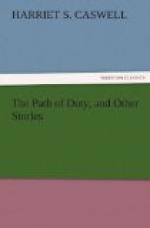When he finished speaking he seemed entirely exhausted.
My father led him into the adjoining room, and assisted
him to lie down upon his own bed. He also gave
him a little wine, which seemed somewhat to revive
him. Observing that he rapidly grew worse, my
father summoned our physician, who was an old friend,
and knew all the circumstances connected with our
former acquaintance with Mr. Almont. When the
physician arrived, he expressed the opinion that death
was fast approaching; said he,—’I
do not think he will see another sun rise,’—and
he did not. He said but little, and suffered but
little pain; but he sank rapidly. His mind was
clear to the last. A short time before his death,
he turned his eyes, over which the film of death was
gathering, to my father, and, with much difficulty,
said,—’Pray—for—me.’
My father knelt and implored the mercy of heaven on
the soul that was departing. I could not bear
that he should leave the world without one word in
regard to what were his feelings in the near prospect
of death. Going near, I said,—’Do
you feel willing to trust yourself to the Saviour’s
mercy to penitent sinners?’ He gave a sign of
assent, and a more peaceful expression settled on his
countenance. ‘I know,’ said he in
a whisper, ’that I have been a grievous sinner
for many long years, yet the forgiveness guaranteed
by you, whom I have so deeply injured, gives me a
hope that God will also forgive the sins, for which
I now trust I feel deeply penitent.’ After
this, he lay for a short time in a kind of stupor.
Suddenly, he opened his eyes, and they rested upon
my father, who stood by his bed-side. His lips
moved slightly, and my father distinguished the words,—’Pray
for me.’ He again knelt and prayed earnestly,
in a subdued voice, for the spirit that was then entering
the unknown future. A few moments after, and
the soul of George Almont was summoned to leave its
earthly tenement. When the small procession that
had followed his remains to their last resting-place
turned from the new-made grave, the two following
lines from Gray’s Elegy came unbidden to my mind:—
No
further seek his merits to disclose,
Or draw his frailties from
their dread abode.’
“Perhaps, Clara,” continued Miss Simmonds,
“you may, in your walks through what is now
called ‘The Old Burial-ground,’ a short
distance from the village, have observed a lonely
grave, marked by a plain marble headstone, and shaded
by the branches of an aged tree; you may have noticed
this grave, and never given a thought to the poor mortal
who sleeps there. That is the grave of George
Almont. Three years later, my father died, and
I was left alone. Since that period I have lived
sometimes alone, and occasionally spending a short
time with any family who happen to require my services,
as I find it necessary to do something for my own
support. I have been able to support myself in
comfort and respectability, and even occasionally to
bestow charity in a small way to those less favored




